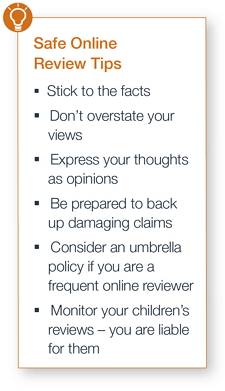Learn how your online reviews could get you in trouble and how you can protect yourself from a costly legal battle.
In
today’s highly connected world, everyone’s a critic. Literally. From
Angie’s List to Yelp, and Amazon to TripAdvisor, the Internet provides
an endless number of forums for sharing opinions and reviews. No matter
what you want to review (from dog walkers to doughnut shops), there is
a site—or three—where it is possible to share your opinion. For many
people, these virtual forums provide the freedom to be candid, or even
outrageous.
But before you post (or Yelp or Tweet), remember that there
are real risks to being an online critic. While most online chatter is
protected under the Charter of Rights and Freedoms, false allegations
and unproven claims can get you in trouble. If you post a particularly
negative review of a local business, for
example, the business owner could come after you for defamation.
While most auto, renter’s and
homeowner’s
policies include some level of personal injury protection, this
protection usually does not extend to defamation and the like. That
means that if you are found guilty of harming someone’s reputation, you
could be on the hook for all damages.
Does this mean you should keep your opinions to yourself, or at least
offline? Not at all. It just means you need to understand what might
get you in trouble and how you can protect yourself.
 Why
online reviews matter
Why
online reviews matter
There is a reason business owners care intensely about online
reviews: People read them, and they believe them. In fact, a 2012
Nielsen survey found that online consumer reviews are the second
most-trusted source of brand information, with 70 percent of global consumers
indicating they trust online reviews[1]. And research by a Harvard
Business School professor found that even a one-star increase in a Yelp
rating leads to a 5 percent to 9 percent increase in revenue[2].
With so much at stake, it’s not surprising that businesses are
willing to fight to protect their reputations; and increasingly, they’re
doing so in the courts. In one high-profile case, a Vancouver-based
mining company filed a lawsuit against an Internet poster who challenged
the company’s ownership of the claim. The lawsuit argued that the
comments were defamatory and harmed the company’s reputation. In 2010,
after nearly five years of legal argument, the Supreme Court of British
Columbia sided with the mining company. The company was awarded $425,000
in damages, one of the largest
awards of its kind in Canada.
In another highly publicized case, a hotel guest was sued for
defamation after he posted a review on TripAdvisor claiming his Quebec
hotel had bedbugs.
Play
it safe
If you are going to post an online review, remember to stick to the
facts, don’t overstate your views and always express your thoughts as
opinions. It’s easy to get caught up in the moment and say, “This hotel
is infested and run by crooks!” when all you need to say is,
“We found roaches in the bathroom and we felt the management was not
appropriately concerned.” Make sure you phrase all comments as your
opinion and be prepared to back up any potentially damaging claims with
evidence.
If you are a frequent online reviewer, you may also want to consider
adding an umbrella policy to your homeowner’s or renter’s insurance. An
umbrella policy
kicks in when you reach the limit on the liability coverage in your
homeowner’s or renter’s policy; and most importantly, it also covers you
for libel. Coverage limits often range from $1 million to $10 million
and carry an additional monthly fee. If you have teenagers in your
house, remember that you are also responsible for their online
actions. An umbrella policy could protect you from libel claims brought
against anyone living in your home.
Keep in mind, an umbrella policy does not give you the freedom to
write outrageous reviews; and if you are found guilty of deliberate
defamation, your insurer could refuse coverage.
To learn more about how an umbrella policy could help you Yelp,
contact your HUB representative.
[1] Global Consumers' Trust in 'Earned' Advertising Advertising Grows in Importance. Nielsen, 4/10/2012
[2] Reviews, Reputation, and Revenue: The case of Yelp.com. Luca, Michael, Harvard, Business School Working Paper, 9/16/2011